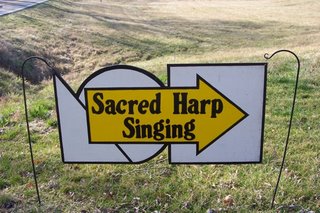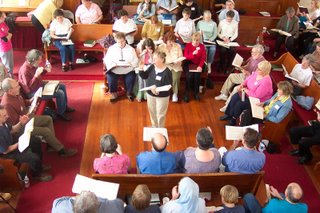Friday, March 31, 2006
Thursday, March 30, 2006
Give me the grace to be contented, the strength to avoid complacency, and the wisdom to know the difference
Lovely Wife was in Philadelphia for a conference last week, and while visiting the meetinghouse at 4th & Arch Streets ran into an old (i.e., of long-standing, not ancient) Friend who was there for a meeting. It so happend that she was coming to Minneapolis on a business trip a few days later, and it worked out that she came for dinner Wednesday evening.
It was one of those wonderful evenings that I value all the more because they're so infrequent. We have the kind of friendship that is a lot deeper than it perhaps ought to be given the relatively few hours we've ever spent together and we are always delighted to see each other. Lots of laughter, a little wine, good food, candle light, excellent conversation, a little gossip, a little music. I was particularly tickled that she has signed up for our Sacred Harp workshop at the Gathering, something we've both been wanting her to do for years, and now it's going to happen. Just a joy.
 Then early this morning L.W. and I went to a fund-raising breakfast at and for In the Heart of the Beast Puppet & Mask Theater, one of two local theater organizations we love and support as we can. We got there an hour early (my fault) but it turned out well because we ran into several friends and neighbors we hadn't seen in a while and got reconnected a little. The whole morning was fun, especially a new video about the HOBT and its unique way of making participatory art and theater real and relevant. I could easly go on about HOBT and May Day and the rest, but I'll leave that for another time.
Then early this morning L.W. and I went to a fund-raising breakfast at and for In the Heart of the Beast Puppet & Mask Theater, one of two local theater organizations we love and support as we can. We got there an hour early (my fault) but it turned out well because we ran into several friends and neighbors we hadn't seen in a while and got reconnected a little. The whole morning was fun, especially a new video about the HOBT and its unique way of making participatory art and theater real and relevant. I could easly go on about HOBT and May Day and the rest, but I'll leave that for another time.
(I will share something I learned, one of those small things that makes the world seem just a bit more sensible. It turns out that the Proto-Indo-European root of the word "art" is [pronounced like] arr-. This is also the root of the English word "arm." It means to join or fit together. The theater's artistic director spoke a bit on the connection between those two words, and it beautifully stated what HOBT does.)
I was still glowing from last night's dinner and this morning's breakfast when I went into a noon time meeting at work. Someone asked me before it began how my life was going -- like he really meant it -- and I said, "Great. My life is going great. My biggest problem is to figure out whether I'm contented or complacent."
It got a laugh, but I meant it. I feel a lot like the old Mose Allison song "I live the life I love (and I love the life I live)." Mostly. Today, anyway. But I also feel like another Mose Allison song title, "Livin' in a Fool's Paradise."
I've got it pretty good, and I know it. Loving family; safe and beautiful neighborhood; good friends; enough money; plenty to read; meaningful work. But also in the deeper, invisible ways; room to grow for sure, but basically peaceful, balanced, at ease; hopeful (if not optimistic); growing. I do feel deeply grateful for it all.
At the same time, I fully realize that much of my inner peace is closely related to my outer comfort. Would I feel the same way if I became Job II? (Or if Only Son tells me one more time that I "owe" him another $60 or $100 in baseball fees in that snotty, entitled, ungrateful attitude-full way he has been perfecting lately?)
I will make no claims. All I can say is, Let it pass and spare me the cup if you can. Please. But thy will, not mine, be done.
Contentedness is a virtue; complacency is a sin. But which is which? And when? And for how long? And what do you call it when your biggest problem (at the moment) is telling the two apart?
Can I be content only if my conscience is dull and insensitive? Who can be "happy" in a world like this?
But who couldn't be?
Is this similar to the old saw about the church's (or a newspaper's) role to comfort the afflicted and afflict the comfortable?
I guess I'll just try to pay attention, enjoy (I wonder what "enjoy" really means?) it while I can, and see what walls I can knock down, or look over next, and be grateful spring is coming.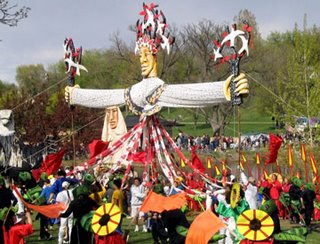
Posted by
Paul L
at
3/30/2006
1 comments
![]()
Friday, March 24, 2006
Sad news of the death of Barbara Greenler
An anonymous comment made to my post about the Missouri Sacred Harp convention repeated the news we all received earlier in an e-mail on March 23:
Dear Ones,Those who knew her would have recognized a brief reference to Barbara in a post last summer after the summer Nightingales gathering:
It is with sadness that we write to tell you that Barbara Greenler passed away last night. She died calmly in her sleep while at home. In the last days she had continued to weaken but seemed to be at peace with her approaching death.
All of us, including Barbara have deeply appreciated the connections, thoughts and care expressed in the cards and letters. We feel powerfully supported by your prayers and love.
We will send out memorial service information in the next days.
Love,
Bob, Lee, Karen, Robin and their families
One of the beloved Mothers, not yet 80 and the grandmother to a whole flock of young Nightingales, has already lost much of her strong, beautiful voice to thyroid cancer a couple of years ago. Now, the cancer has returned and the outlook is uncertain. She looked strong, but had her limits. We know that she made a heroic effort to come, knowing that this might be her last time.I saw her only once since then, briefly, at meeting in Madison in October, and remember thinking how well she looked, almost glowing.
It is beyond my power to say what this sad news means to me. Any attempt I might make to explain what Barbara meant to me and my life as a Friend, and as a human being, can only dishonor her by its pathetic inadequacy. All I can think to say now is from a verse of the song "Special Silence" from the old Songs of the Spirit:
In that silence I can share my thoughts with Friends who really care,Barbara was a friend who really cared. She's the kind of friend I'd like to be.
And sometimes I can even see the kind of Friend I'd like to be.
Later: Liz Opp has a lovely, personal rememberance of Barbara here.
Posted by
Paul L
at
3/24/2006
1 comments
![]()
Thursday, March 23, 2006
Free at last
Like many others, I felt a great rush of joy and relief at the news that the three surviving Christian Peacemaker Team members were freed early this morning. I look forward to hearing their stories, not only of their captivity, but also of what they saw and learned in Iraq before their kidnapping. Perhaps their momentary notoriety will gain a little more attention from the mass news media than they were given before.
I've also been noticing discrepancies regarding the circumstances of Tom Fox's death that the Peacemakers may be able to clear up. I read Martin Kelly's note that Tom's family members reported that his body showed no signs of torture as had been initially reported, and was reported again as late as yesterday's New York Times. I wonder sometimes at the way rumors and accepted truth gets promulgated even after reliable witnesses contradict it.
Then I read this in the on-line news.telegraph from the UK about the secret "SAS" team that freed the hostages and how they learned where they were:
In every such case there needs to be a break in order to put that information together and this time it came in a particularly tragic and unwanted way when the corpse of Tom Fox, the fourth member of the Christian Peacemakers team taken in November, was found two weeks ago.The article also refers to an Iraqi arrested the night before the rescue who "cracked" and gave away the hostages' location. I hope the word "cracked" was used loosely and not as a synonym for "tortured." That would be a cruel irony indeed.
An examination of his body led investigators to conclude that he had not been executed, as had been thought. There was no shot to the head as is usual in Iraqi executions.
Instead three bullet wounds were found in his arm and three in his chest. The bruising thought to be signs of torture was instead seen as evidence of a struggle.
Investigators concluded the kidnappers had not killed him simply because he was American. He had been killed possibly while trying to escape - which would explain the lack of a video of his murder that would usually accompanies a politically-motivated killing.
The kidnappers appeared to have lost control of the situation, and their unintended act had led to new leads. By last weekend hopes of a possible rescue were increasing. . . .
Another is that, because of the arrest of their comrade, the kidnappers ran away to fight another day, leaving the Peacemakers to be rescued without a shot being fired. (All this according to the news.telegraph.)
Posted by
Paul L
at
3/23/2006
0
comments
![]()
Wednesday, March 22, 2006
What's in a name?
Lovely wife has an ancestor named Hatevil (hate-evil) Nutter who, besides being a nutter, was an instigator of the infamous whipping of the three Quaker women 1n 1662. We've often thought what an odd name he had and wondered what his parents were thinking. I mean, why not Be-a-good-boy-and-stop-whipping-the-Quakers Nutter?
Today, reading David Hackett Fischer's fascinating Albion's Seed: Four British Folkways in America, I came across this paragraph that may explain it. It's in the section describing the naming customs of New England Puritans, most of whom came from East Anglia in Britian. But a few of them came from Sussex, and they had different customs. He writes:
A great many English Puritans lived in Sussex, for example, but only about 1 percent of New England's immigrants came from that county. Sussex Puritans made heavy use of hortatory names such as Be-Courteous Cole (in the Parish of Pevensey), Safely-on-high Snat (Uckfield), Fight-the-good-fight-of-faith White (Ewhurst), Small-hope Biggs (Rye), Humiliation Scratcher (Westham), Kill-sin Pemble (also Westham), and Mortifie Hicks (Hailsham). A classic example was an unfortunate young woman named ffly fornication Bull of Hailsham, Sussex, who was made pregnant in the shop of a yeoman improbably called Goodman Woodman.Sounds like the Nutters may have Sussexers (say that three times real fast), no?
But the East Anglians weren't exactly eccentricity-free themselves.
What a world.The East Anglia Puritans in New England gave virtually all of their children Biblical names. Few biblical names failed to be bestowed upon one New England baby or another. Some parents cultivated a spirit of scriptural uniqueness. One unfortunate child was named Mahershalalhasbaz, the longest name in the bible. Another, the son of Bostonian Samuel Pond, was baptized Mene Mene Tekel Upharsin Pond. There is evidence that parents sometimes shut their eyes, opened the good book and pointed to a word at random, with results such as Notwithstanding Griswold and Maybe Barnes.
Your friend,
Every-living-thing-that-creepeth L.
Posted by
Paul L
at
3/22/2006
0
comments
![]()
Saturday, March 18, 2006
While snooping on Site Meter, I was led to this article about the Missouri convention in 2004. It's funny how we find some of the same people to be photogenic.
Posted by
Paul L
at
3/18/2006
1 comments
![]()
Thursday, March 16, 2006
Missouri Convention
Last Friday, my friend Gerry and I drove 500 miles to the Missouri State Sacred Harp Convention in Pinckney Township, Missouri (about 90 miles west of St. Louis). It was my first out-of-town Sacred Harp singing experience (other than workshops I’ve led myself), and it turned out to be as fun as I hoped it would be, and more.
When we left St. Paul, Gerry said he’d discovered that the town where he went to college, Iowa Weslyen in Mount Pleasant, Iowa, was on US Highway 218, and that the song “Mount Pleasant” was song number 218 in the Sacred Harp. So he wanted to stop by the college and sing the song.
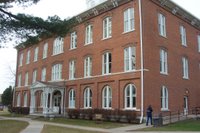
When we got to Mount Pleasant, we went to Old Main, the music building on campus, intending to sing in front of the building. Gerry, however, urged me to see the inside. After a brief glance around, we were approached by Gerry's old music professor, Dr. Joel Brown, who greeted us fondly and enthusiastically. We expressed our interest in singing this 4-part song and lamented the lack of two more voices. Dr. Brown rose to the occassion and introduced a newer music professor, Jamie Spillane, who joined us in singing in full voice, Mount Pleasant.
There is a house not made with hands,
Eternal and on high;
And here my spirit waiting stands
Til God shall bid it fly.
It sounded GREAT in the resonant old place. It had a sweetness to it and Gerry & I couldn’t stop smiling for miles.
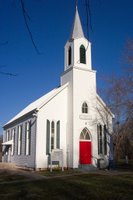
 Pinckney Township and St. John’s UCC Church, a lovely old church from a German predecessor of that denomination. I first thought it might have been a Lutheran church because the pulpit was high on the wall, in the center, above the alter, symbolizing the Word over the sacrament, but it turns out that it was in a German branch of the several churches that united to make the UCC. On the alter was a German bible, opened to Psalm 23.
Pinckney Township and St. John’s UCC Church, a lovely old church from a German predecessor of that denomination. I first thought it might have been a Lutheran church because the pulpit was high on the wall, in the center, above the alter, symbolizing the Word over the sacrament, but it turns out that it was in a German branch of the several churches that united to make the UCC. On the alter was a German bible, opened to Psalm 23.About 100-125 singers sang at any one time, with a good number of visitors sitting in the back or up in the small balcony. I recognized many of them – singers from St. Louis, Chicago, Kansas City, Madison, Georgia – from their visits to Minnesota sings, and it had the feeling of a family reunion with a bunch of cousins (like Friend Peggy Senger Parson's brother), a lot like arriving at Yearly Meeting or FGC, but smaller.
It was particularly nice to see Bill Shetter, a Friend from Bloomington (Ind.) Meeting who Lovely Wife knew when she was in graduate school and who attended our Sacred Harp workshop at the Gathering in 2002. I just love seeing his long lanky frame lead a song, and hearing his strong high treble voice.
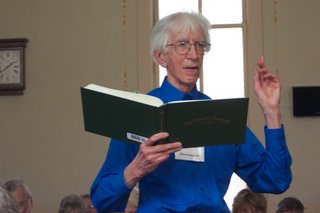 The singing was strong. The singers were experienced and moved right along, singing more than eighty songs each day. The room was resonant, but it never developed the overwhelming wall of sound that you get in some places. Nevertheless, it was easy to sing in, the country setting was beautiful, and I easily lost myself in the singing. It often felt to me as if I could have been in this same church 100 year ago, singing the same songs, in the same way, just like I do when I am in meeting for worship. I feel part of a family that extends backwards – and forwards, God willing – for centuries
The singing was strong. The singers were experienced and moved right along, singing more than eighty songs each day. The room was resonant, but it never developed the overwhelming wall of sound that you get in some places. Nevertheless, it was easy to sing in, the country setting was beautiful, and I easily lost myself in the singing. It often felt to me as if I could have been in this same church 100 year ago, singing the same songs, in the same way, just like I do when I am in meeting for worship. I feel part of a family that extends backwards – and forwards, God willing – for centuriesOne of the best things was singing songs from the new Missouri Harmony. This book, a labor of love by many in the St. Louis singing community and of scholarship by the Missouri
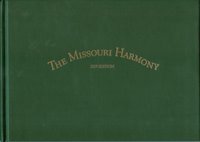 Historical Association, reprints many (all?) of the songs from the old Missouri Harmony first published in 1820 (making it 24 years older than the Sacred Harp). It’s said that Abraham Lincoln and Ann Rutledge sang from the Missouri Harmony in her father’s tavern in New Salem, and it was a very widely used book until supplanted by the Sacred Harp.
Historical Association, reprints many (all?) of the songs from the old Missouri Harmony first published in 1820 (making it 24 years older than the Sacred Harp). It’s said that Abraham Lincoln and Ann Rutledge sang from the Missouri Harmony in her father’s tavern in New Salem, and it was a very widely used book until supplanted by the Sacred Harp.The new Missouri Harmony is freshly typeset and legible – which could not be said of the old facsimile reprints – and has a nice Lincoln-green cloth cover. In addition to its original contents, the new book has many new tunes composed or arranged by contemporary writers, five or six of whom were there singing with us.
Dinner on the grounds was as fine as any I’ve ever had; plenty and tasty. (The only odd thing was no fried chicken. But there were barbecued pork chops which make up for it.) When I was a boy and spent time with a family in our church who were Missouri country people, they gave me sweetened ice tea. The only place I know I can get and drink sweet tea is at Sacred Harp conventions.
Saturday was gloriously warm and spring-like, which inspired me to lead 338 on the top, Winter:
His hoary frost, His fleecy snow,
Descend and clothe the ground;
The liquid streams forbear to flow
In icy fetters bound
He sends His word, and melts the snow,
The fields no longer mourn;
He calls the warmer gales to blow,
And bids the spring return.
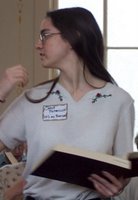 Sunday began with Carla, a young woman whose 20th birthday it was. She led #436, Morning Sun:
Sunday began with Carla, a young woman whose 20th birthday it was. She led #436, Morning Sun:Youth, like the spring, will soon be gone,
By fleeting time or conq’ring death;
Your morning sun may set at noon,
And leave you ever in the dark.
Your sparkling eyes and blooming cheeks
Must wither like the blasted rose.
The coffin, earth, and winding sheet
Will soon your active limbs enclose.
The final chorus on this song has one of those bull-dozing alto parts that led to the expression “Alto isn’t a part, it’s an attitude.” Carla's an alto.
Morning Sun isn’t exactly the sentiment that a typical young American woman would choose to sing about on her 20th birthday, but one of the things we love about the Sacred Harp is its unsentimental telling-it-like-it-is-ness, no sugar coating. (Carla got involved in Sacred Harp singing when she saw an advertisement for a Missouri convention several years ago. She chose it as the family outing she was entitled to on her birthday, and she and her family has been singing ever since.)
On Sunday afternoon, I led #528, Showers of Blessings, the song that inspired the title of this blog.
With songs and honors sounding loud,This song was particularly appropriate since powerful storms had raged through central Missouri Saturday night and Sunday morning and threatened all afternoon.
Address the Lord on high,
Over the heav’ns He spreads His clouds,
And waters veil the sky.
He sends His show’rs of blessing down
To cheer the plains below.
He makes the grass the mountains crown,
And corn in valleys grow.
On Sunday, before dinner, we had the traditional memorial lesson where two singers say a few simple words about those who have passed on during the previous year with whom we hope to sing again in heaven, and those who are sick and shut-in and cannot be with us. Among those we sang for were my Friends Elizabeth Watson, Mary Phillips, Charles Johnson Barbara Greenler. Had I known, I would have added Tom Fox as well.
I don’t remember what songs we sang for the memorial lesson, but after I arrived home and heard of Tom’s death I know which one I would have chosen: #547, Granville (music composed by Judy Hauff, who was with us in Missouri):
Remember, Lord, our mortal state;When it was over we drove north, full of life and love and pork chops. We anticipated overnighting in Iowa if we didn’t feel like driving all the way that night, but when we figured we’d make it by 1 o’clock we decided to press ahead. And we’re glad we did. Our last hour or two was through the sleety precursor of the biggest snowfall of the season; if we’d stopped Sunday night, we’d never have made it home on Monday.
How frail our lives! How short the date!
Where is the man that draws his breath,
Safe from disease, secure from death?
Lord, while we see whole nations die,
Our flesh and sense repine and cry;
Will Death forever rage and reign?”
Or hast thou made mankind in vain?
Oh my this has gone on a bit, and I’ve said nothing of our wild goose chase for a fish dinner on Friday night, the wonderfully winding and hilly country roads we drove, the winery, Daniel and Rachel Boone’s original gravesite, red-tail hawks, St. John Church’s Methodist doppelganger (right down to the sheet metal steeple, red doors, and hand water pump) a mile up Highway U, the sinking feeling I had for a couple of hours when I thought my iBook had been stolen, the camera that broke, Hermann Mo., or the Subway girls in Owatonna who fed us our last supper. It’s enough to say, for now, that it was a great adventure of a kind I haven’t had for a long time.
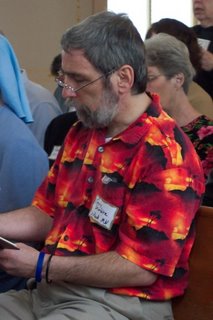
(Revised 3-18 to clear up some dumb errors.)
Posted by
Paul L
at
3/16/2006
4
comments
![]()
Monday, March 06, 2006
He who hesitates is lost
You all probably realize this already, but the FGC website says that registration is closed (but they're taking names for a waiting list). This is 3-6. The day our paper registration form arrived.
Wow.
Among the too-late is the co-leader of my workshop. His e-mail to me was at 1:57 pm CST today.
Wow.
I am stunned and full of questions. Are there some slots reserved for paper registrants? What other workshop leaders may have thought they had more than five-and-a-half days to register? What if, say, Arthur Larrabee or John Calvi (whose workshops are sold out) figured they had, say, a week and didn't get around to it?
I'm glad I'm not the one answering phones at FGC tomorrow. Hell knoweth no fury like Quakers screwed; I still remember the anger when we had run through a week's allotment of granola at Boone in 1988 on Tuesday morning.
Posted by
Paul L
at
3/06/2006
6
comments
![]()
Friday, March 03, 2006
Singing from the Sacred Harp
Since it appears to be the fashion to announce our FGC Gathering workshop choices, allow me to invite you to consider #36, Singing from the Sacred Harp which I am co-leading with Robin Fox. As I reread the extended description of the workshop, I realize that it is a pretty good summary of why I love to sing this music and how it has reenergized my spiritual life. Here's an edited version of the short and extended descriptions:
Singing from the Sacred Harp. The Sacred Harp is a vigorous, four-part, a cappella hymn singing tradition that many Friends find to be a powerful spiritual practice. New singers will learn and experienced singers will grow in their appreciation of the Sacred Harp. Emphasis will be given to connecting the Sacred Harp to Quaker practice.
(P/T, D-I) Percentage of time: Worship/worship sharing 10; Lecture 5; Discussion 5; Experiential 80
The Sacred Harp is a living tradition of four-part acapella hymn singing. Begun in New England more than 200 years ago, the tradition took root in the southern United States and has been sung continuously ever since. Sacred Harp singing now occurs regularly in many communities outside of the South and is experiencing a rejuvenation and renaissance. The tradition is characterized by its full-voiced vigor, democratic participatory ethic, unique harmonies and system of musical notation, eclectic religious imagery, and strong sense of historic continuity and community.
The Sacred Harp is also the name given to the most popular collection of shape note songs where the notation of music is printed on a standard musical staff but in four shapes (triangle, oval, square, and diamond) instead of the more common oval. The Scared Harp we will sing from was first published in 1844 and most recently revised in 1991. It contains more than 500 songs expressing a wide range of musical styles, poetic imagery, and theological perspectives, though the texts are predominantly evangelical Christian in flavor and orientation. The book is available for $20 by mail order through Quaker Books at FGC and at the Gathering. Participants should acquire a copy prior to the workshop.
This is a participatory workshop open to new, beginning, and experienced singers alike. While there will be brief periods of silent worship to begin and end each session, most of the workshop and worship will take the form of singing. We will have worship-sharing each day, but there will be relatively little time for individual, personal expression as compared to other workshops. Nearly all of the activities will be done with the entire group.
The principal objectives of the workshop are that:
1. New singers will learn the rudiments of Sacred Harp singing and its traditions;
2. Experienced singers will grow in their skill and appreciation of the tradition;
3. All singers will be led to deeper understanding of how Sacred Harp singing fits into their lives as Friends.
Early in the week, we will cover the rudiments of shape-note singing: the names of the shapes; the major and minor scales; how to sing the shapes; how to beat time and lead a song; how to sing vigorously and with an open heart; etc. As the week progresses, there will be less explicit instruction and more learning by singing. The leaders will take care to progress to more complex or difficult songs at a pace that will be comfortable for most singers, especially newer ones.
Woven throughout the week and the singing will be very brief lectures or discussion of certain non-musical aspects of the Sacred Harp tradition, especially its history and practices, in order to help Friends place the tradition into its historical, religious, sociological, and musicological contexts. This information is helpful to help deepen participant's appreciation of the singing, but is of secondary importance and will not predominate the workshop.
Each day, we will have worship-sharing during which time Friends can ponder and share with others how Sacred Harp singing (or music in general) has affected their spiritual lives and lives as Quakers. On the second-to-last day, we will hold a "memorial lesson" to remember Friends and family who have died, are shut-in, or are otherwise in need of prayer.
No specific preparation is necessary, but Friends who are unfamiliar with Sacred Harp singing may wish to learn a little about it before enrolling in the workshop. If Friends can arrange to attend a Sacred Harp singing in their home communities before the Gathering, it will be very helpful preparation. The times and location of local singings can be found at www.fasola.org Participants may also wish to visit that site to locate additional information and resources, including recordings that they may listen to before the workshop.
I have felt called to share and teach Sacred Harp singing with Friends for many years, ever since learned to sing at an afternoon session at the 1987 Gathering. I knew from the start that Sacred Harp singing was going to be a part of my religious and spiritual life as a Friend, and that has proven to be true. I have a strong voice and a gift for teaching and have used them to help other Friends to learn and enjoy Sacred Harp singing.
In the experience of singing itself, I have felt the power of God knitting a diverse group of individual voices into a single, harmonious choir. I believe that the texts of the songs in the Sacred Harp which are eclectic but heavily influenced by Biblical texts are an important resource to Friends who, in general, tend to be unfamiliar with the Bible. By learning these texts through singing, and internalizing their powerful imagery and language, I believe God is helping Friends rediscover and reclaim the Biblical narrative as their own.
Posted by
Paul L
at
3/03/2006
7
comments
![]()
